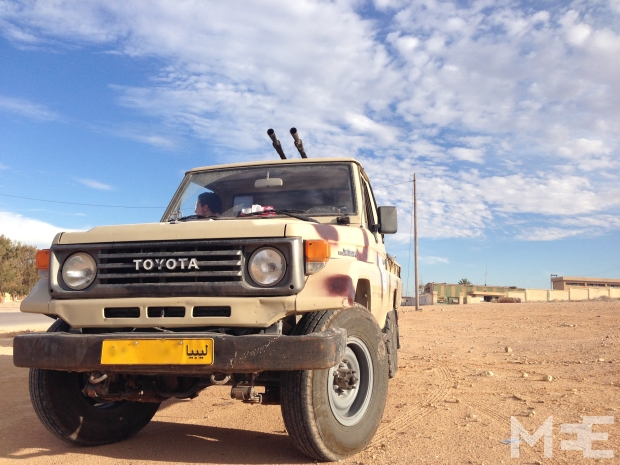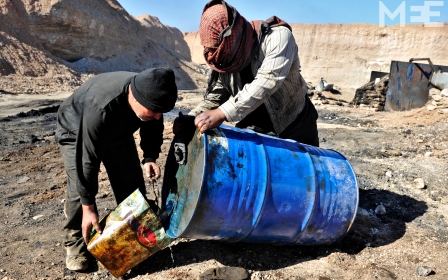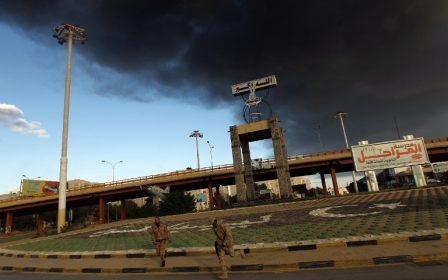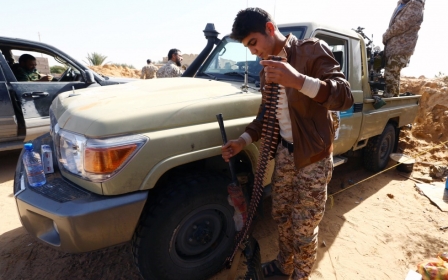IS strengthens presence on Libyan coast
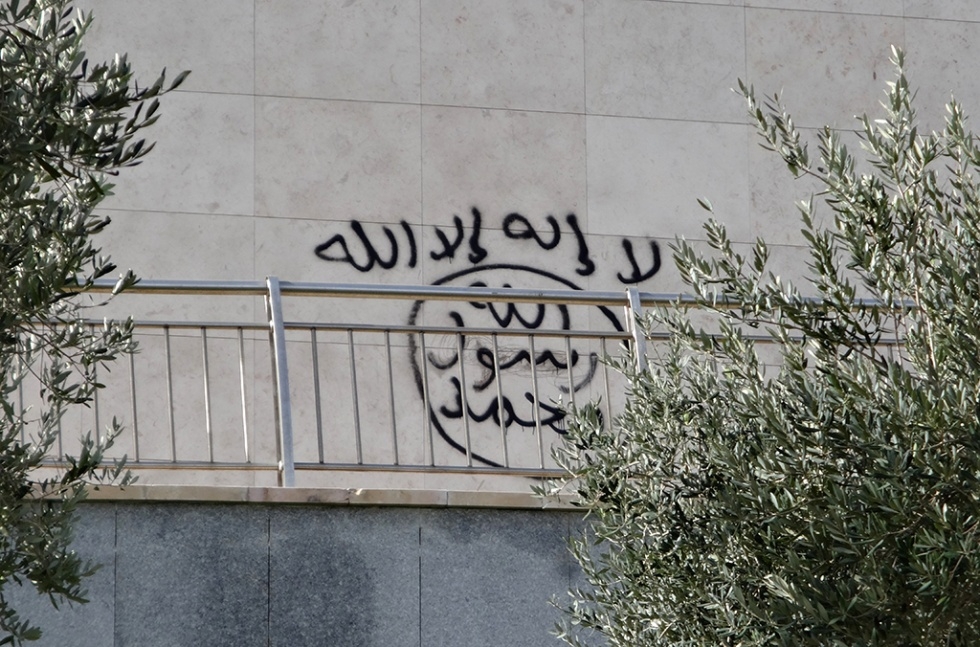
TRIPOLI - The takeover of two radio stations and a semi-functioning TV station in Sirte is the latest move by the Islamic State in Libya to strengthen its presence on the coastal highway that runs between Tripoli and key oil facilities.
"After Friday prayers, they started preaching on the radio about Islam, saying that Muslims had a duty to go abroad and fight jihad," Ahmed, a local resident, told Middle East Eye. Statements from Islamic State leader Abu Bakr Al-Baghdadi were also reportedly broadcast over the airwaves. IS members who made sporadic appearances in the town were easily recognised by their long beards and Afghani-style clothing, Ahmed said.
IS has been building its presence in deposed dictator Muammar Gaddafi's former hometown of Sirte since March 2014. The group is said to occupy two large farms on the outskirts of the town, formerly owned by Gaddafi's education minister, Ahmed Ibrahim.
Local authorities had previously denied any IS presence. This week, a spokesperson for Sirte Local Council said he knew nothing about it. When pressed, he said: "No comment."
The IS already controls the eastern town of Derna, and the takeover of media outlets in Sirte is IS’s second major move in the past week. Five days earlier, a convoy of armed vehicles entered the small desert town of Nufaliya, 130 kilometres east of Sirte, and declared it part of the Islamic State.
"About 50 vehicles drove into the town from the desert, flying the black flag and taking over," said one terrified local resident, speaking on condition of anonymity. "People feel threatened by them and are staying inside their homes. Everyone is afraid of Daesh [the Arabic acronym for Islamic State of Iraq and Syria]," the resident said. "We are all Muslims, but this is not Islam."
IS had distributed papers to members of army and police units in the town to sign, renouncing any allegiance to government ministries and resigning from their posts, he said. Anyone refusing to sign within 72 hours had been threatened with death, forcing some officers to flee the town.
IS policemen were already starting to patrol Nufaliya, the resident said, instructing women to wear the niqab (full-face covering) and warning local people if they did not adhere to the strict principles of IS they too could be killed.
Another resident, Mohamed, said that several of the IS members were Yemeni, and others who spoke poor Arabic, confirming assertions made by officials that some extremists operating in the country were from abroad.
The IS also took over a complex of buildings just outside Nufaliya. This was housing foreign medical staff, mainly from Ukraine and India, evacuated from Ben Jawad - a now-deserted nearby town at the centre of the battle for control of Libya’s oil facilities between the Tripoli-based government and its rival government in the east of Libya. The staff immediately left the premises, as instructed, he said.
The militant group Ansar Al-Sharia in Libya (ASL), formed during the Arab Spring, has had a low-level presence in Nufaliya since 2011, Mohamed said. He explained that just 10 days before IS arrived in the town, the local leader of ASL had returned from fighting in Syria, where some suspected he had been radicalised.
Libya’s chaotic civil war, with multiple front lines along the coast, has created a security vacuum in which IS has been able to flourish unchecked. Mohamed said it had been stealthily conducting suspicious operations in desert locations for some time.
Camel herders searching for their animals had reported seeing heavy machinery digging holes in remote places, including an area called Mozouriat,15 kilometres outside Nufaliya, he said. Several shepherds had been briefly detained, questioned and told not to return to the area.
Many locals believe that IS has its sights set on Libya’s oil facilities. Sirte and Nufaliya are strategic positions which could enable the group to control the coastal highway leading from the west of Libya to three of country’s largest oil ports.
"We think Daesh is targeting the oil for the money, so it can sell it on the black market and get more weapons," a local official said. "And they are coming from behind, from the desert."
On Friday, local media also reported IS attacks on two oil fields in the area. With the ports of Sidra and Ras Lanuf closed while rival government forces battle for their control, these oil fields are at present inactive.
Earlier this month, IS launched an assault on the Mabruk oil field, killing nine guards and kidnapping three Filipino workers, who remain missing, according to the Tripoli-based Oil Minister Mabrouk Al-Zway. He added that the attackers stole vehicles, weapons and ammunition from the site.
Salah El-Jabu, commander of the Tripoli-based forces at Bin Jawad, east of Sirte, recently described extremist groups in Sirte as a big problem, and were believed to be behind a number of kidnappings and killings of military traveling on the coast road between Misrata and Bin Jawad.
Three members of his unit were killed by IS near the coastal road the day it took over Nufaliya, prompting a firefight between the two groups. Although the clashes died down, IS continue to operate checkpoints manned by heavily armed vehicles near the coastal road.
Jabu said Islamic extremists would present his forces with second fight after the defeat of forces operating under the eastern-based government. "We are Muslim, but we will not allow people to build stronger ideologies in our country."
The takeover of Nufaliya and media outlets in Sirte, both areas under the jurisdiction of the Tripoli-based government, however, indicate that IS is taking advantage of the current conflict, which has left forces thinly spread across several front-lines.
IS operations in Libya also featured in the latest release of IS publication "Dabiq", where it claimed responsibility for the kidnapping of 21 Egyptian Coptic Christians in Sirte and January’s attack on the capital’s Corinthia Hotel, which left 10 people dead.
Despite the Tripoli-based government’s open lenience towards ASL, in "Dabiq" both its Prime Minister, Omar Al-Hassi, and other officials were referred to as "Murtadd" (a derogatory term applied to those who have stopped being Muslim). This term was also applied to the Libyan hotel security, three of whom died trying to repel the terrorist attack, illustrated with an out-of-date picture of revolutionaries entering the hotel in August 2011.
Officials in Tripoli have remained tight-lipped about the presence of IS in Libya. A spokesperson for the defence ministry claimed the numbers of IS adherents were still small, in the hundreds rather than thousands, but admitted: "Although we could talk to ASL, we cannot talk to IS."
Middle East Eye propose une couverture et une analyse indépendantes et incomparables du Moyen-Orient, de l’Afrique du Nord et d’autres régions du monde. Pour en savoir plus sur la reprise de ce contenu et les frais qui s’appliquent, veuillez remplir ce formulaire [en anglais]. Pour en savoir plus sur MEE, cliquez ici [en anglais].


